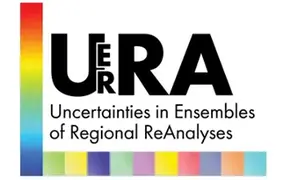UERRA – Uncertainties in Ensembles of Regional ReAnalyses
The project objective is to develop and run an ensemble system of regional reanalyses for the climatological time scale. The information content of the datasets and their uncertainties will be assessed in several ways and statistics analysed.

The UERRA project will provide long-term datasets of Essential Climate Variables (ECVs) on the European regional scale in order to support adaptation action and policy development. The datasets will contribute to Climate services for GMES (Global Monitoring for Environment and Security), climate monitoring and research. Regional reanalyses will be made in Ensemble mode and there will also be individual reanalyses with different models and methods.
Observational data rescue (digitizing data in archives not currently available for use) will continue from EURO4M and enhanced gridded datasets will be developed and used for validation. The ensembles together with gridded datasets will form the basis for estimation of uncertainties of the constituent members.
Large datasets will be built up and open and user-friendly access methods will be established together with the work in other topics of the SPACE call.
This project builds on the experiences and developments in EURO4M but now the reanalyses will cover climate analysis time scales (30 to 50 years) and pioneer ensemble techniques for regional scale and high-resolution reanalysis. It will build on and extend the global reanalyses (topic -01 ERA-20C, ERA-CLIM and ERA-Interim).
Further downscaled high-resolution reanalyses will also be performed where more near surface ECV observations can be utilized. Indicator information (including uncertainties) will be applied to the reanalyses and there will be extensive validation against remote sensing and hydrological data. They will add to the validation effort, respond to user requirements, and demonstrate how the reanalysis information is best utilized for understanding past climates and climate change.
About the project
Role of SMHI
Besides coordinating the project, SMHI will work run the HARMONIE Data Assimilation system for the entire European area with surrounding sea areas at as high resolution as is possible (11 km and 65 levels). It will be run over a 50 year period, from 1961, and serve as one member of a multi-model reanalysis. The data assimilation will be driven and constrained by the global ECMWF ERA-CLIM reanalysis to add large Atlantic scale information from ECMWF satellite assimilation. into the 3D-VAR minimisation. SMHI will also produce a pan-European analysis of cloud fraction at 5.5 km resolution for the years 1982-2013 by combining good quality data CM-SAF data from geostationary and polar platforms.
Project partners
- SMHI
- Meteo-France
- Koninklijk Nederlands Meteorologisch Instituut-KNMI
- Met Office
- University of East Anglia
- Eidgenoessisches Departement des Innern
- Universitat Rovira i Virgili
- Administratia Nationala de Meteorologie R.A
- European Centre for Medium-Range Weather Forecasts
- Deutscher Wetterdienst
- Meteorologisk Institutt
- Rheinische Friedrich-Wilhelms-Universitaet Bonn
Funding
European Union's Seventh Framework Programme under grant agreement No 607193.
Project period
The project was carried out during 2014-2017.

